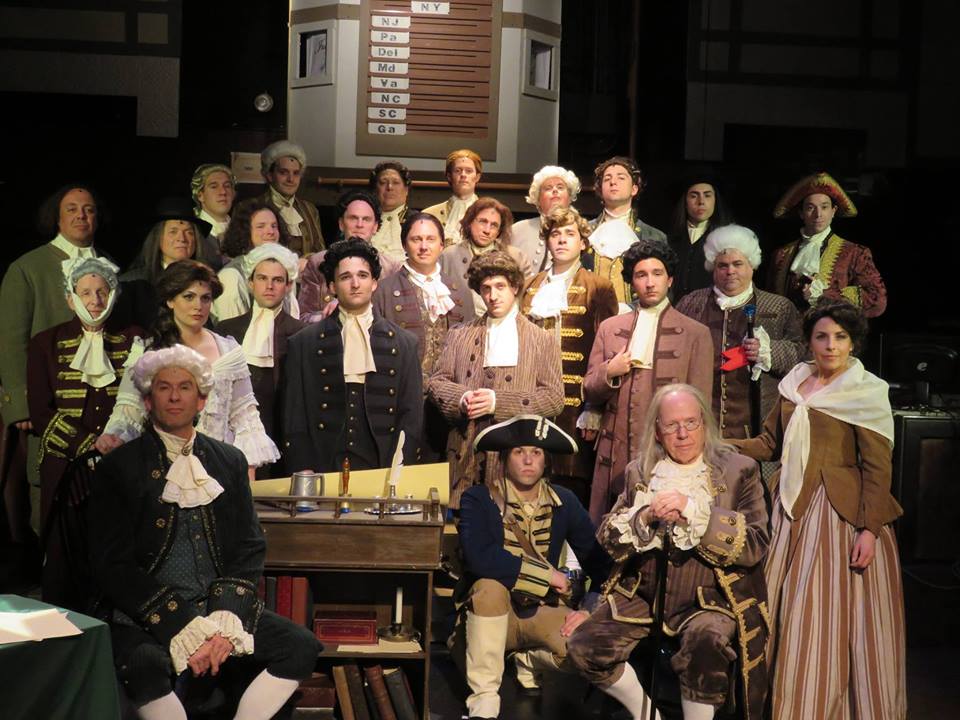Somebody opened up a window over at Toby’s Dinner Theatre and all of the thrilling behind-the-scenes details of their current production of 1776 have come freely flowing out into the open. In a TheatreBloom exclusive interview series entitled Vote Yes: Inside Independence Hall we sit down with the cast and creative team of the production to find out just what it’s like to mount this iconic historical event as a musical this season. Launching the interview series is Co-Director Jeremy Scott Blaustein with his insights to the production.
Thank you for giving us your time, Jeremy. If you could give us a little background of where you are and how you got here to be the Co-Director of 1776, that would be a great start.
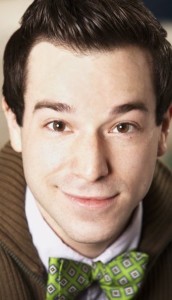
Jeremy Scott Blaustein: My name is Jeremy Scott Blaustein, for this production of 1776 I am Co-Directing with Shawn Kettering and I am also playing Richard Henry Lee. Also at Toby’s I have performed in Pirates of Penzance as a pirate and a policeman. Then I was in Memphis as one of the character male tracks and understudied Huey. I did go on for one performance. My whole family got to see it. What a thrill!
You’re relatively new to the Washington DC scene, is that correct?
Jeremy: Well, I grew up in Baltimore. I went to Carver Center for the Arts where I was a theatre major and studied acting. From there I went to Shenandoah University in Virginia. After graduation, I bounced around to wherever there were gigs. That took me to New York where I wound up producing 17 shows on Broadway. It was a amazing experience. But, honestly, it was never what I thought I would be doing. I had trained as an actor and a director so producing was what Julia Cameron calls a “shadow profession,” — you are as close as possible to the thing that you wanted to do that you’re standing in its shadow. After a few years, that can take its toll. And as much as I loved the experience, I felt that I had learned everything I was going to learn. I knew it was time to move on and refocus on creative endeavors.
That brought me back to the Baltimore. Since then I’ve written a novel, The Home for Wayward Ladies, and that was published in May of 2014. (When it was first released it was ranked number one paperback gay fiction on Amazon.) Then I wound up booking a gig directing the Off-West End (London) over the New Year; a play called Truth, Lies, Diana. It’s about the conspiracy theories relating to the death of the people’s princess. The press had a field day with us and not always in the most positive ways. It’s a very sensitive subject, but there are suspicions surrounding her death that the play explores. It also questions the parentage of Prince Harry. That little tidbit got us picked up in international press when we were still in rehearsals. Our play became the number one trending story for four or five days in The Daily Mirror. They made news in England, Ireland, Scotland, France, Israel, the US, Canada, Mexico, Egypt; everyone was talking about it.
Is 1776 a production that’s near and dear to you?
Jeremy: I have always loved 1776. It has been a favorite of mine ever since I was as a kid. I watch every year on the 4th of July. Every single year I have to watch it on the 4th of July. This show has always had my heart. So when the opportunity at Toby’s arose for this production, I jumped. I knew I wanted to be in it. I didn’t know that I would be directing it. So when the possibility was presented, it was the best of all possible worlds.
You did say you’re in it? How did that work itself out?
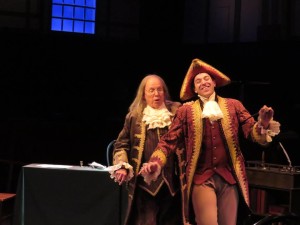
Jeremy: I am playing Richard Henry Lee, delegate from Virginia along with Thomas Jefferson. Now, Richard Henry Lee actually happens to be a good role for someone who is Co-Directing because he’s only in the first three scenes. So that means the rest of the show I can focus primarily on what’s going on with the rest of congress. There was never a rehearsal where for the first three scenes I wasn’t sitting in congress with my director’s notepad, where I knew my cue lines were coming up. So I’d put down my director notes, act for a moment and then go back to focusing on direction. It’s been an interesting challenge. It’s not the first time that I’ve been in a show that I’ve directed, but that doesn’t mean it doesn’t have its own particular complications.
What is the challenge of taking on Richard Henry Lee in addition to the directorial challenges of the show?
Jeremy: I think that at this point it’s making sure that both get the equal amount of attention that they deserve. I hope throughout the rehearsal process I have struck the appropriate balance to give my fellow cast members what they need from an actor in scene across from them. When I’m in a scene, they can’t feel like I’m directing them or urging them, but that I’m honestly and naturally listening, responding, and reacting appropriately as my character would– not as their director.
Can you tell us about that song he gets? “The Lees of Old Virginia” You’re a song and dance man, right?
Jeremy: I consider myself a song man that moves well. The song is a blast. It’s a lot of fun to perform. It’s very high energy. It’s the kind of stuff that I love doing—silly with plenty of puns.
Was the casting process difficult?
Jeremy: I had absolutely everyone I needed show up to auditions. To be honest the most interesting part of the casting process was deciding who goes where. There are a lot of congressmen and they all have very particular attributes that Peter Stone has so beautifully written into the script. Those need to be fulfilled in order for there to be a differentiation of character between Pennsylvania, Virginia, Delaware, etc. Some of the actors are Toby’s regulars, some of them are new to us. This show requires a lot of men so we did have to pull from beyond— well pretty much from everywhere and anywhere that we could have people come from.
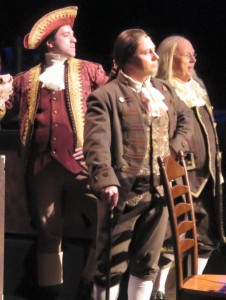
That blend of familiar faces and new faces is very useful for this show. There are younger delegates who are less familiar with the practices of the congress and want to implement change who are put up against those with a more firm idea of how things are done.
Is this your first time directing in the round?
Jeremy: I was the directing fellow for My Fair Lady at Arena Stage. Also, I have directed several other productions in thrust (where the audience is on three sides), which is only one step away. But what I really do love about directing this piece in the round is that you really do wind up in the continental congress. You walk into the room and you are with them– among them for one of the most important moments in our history. You are witness to the moment we became America. When you sit with them and experience them from every angle, it makes it more immediate. You are more than just a witness to history than if this were being presented on a proscenium stage where there is that automatic separation.
What has been the biggest challenge personally as a director to get this show up on its feet?
Jeremy: This show actually holds the record on Broadway for the musical with the longest scene without a song. Scene three is about 25 minutes long without a song. It was the first time ever that the Musician’s Union on Broadway permitted the players to leave the pit. There was enough time for them to go and get a sandwich. For me as a director that comes down to pacing. You should feel like this is a labored debate, but you mustn’t feel like you’re trapped.
Also, we have to keep in mind that these are real men and women. They deserve a particular reverence—all while ensuring that this makes for an evening of entertaining theatre.
Do you have a moment in the show that speaks to you or that really defines the show for you? Other than maybe your number as Richard Henry Lee.
Jeremy: To be honest, I think that Richard Henry Lee is a bit of a trifle—a necessary diversion. And that’s fine. It’s a funny show, but it’s a serious show with a lot to say. That means there need to be some silly things that happen along the way.
What I have always found interesting about this show is that the audience already knows how it ends before they walk through the door. Spoiler alert: we become America. But it is written in such a masterful way that you actually begin to doubt the outcome. You find yourself surprised many times. So, to answer your question—there isn’t one moment in particular that defines this show for me. But I do live for any moment when we can take the audience by surprise.
This is very different than anything Toby’s has ever put on its stage. How has knowing that you were taking on— what a lot of people refer to as a play with music— this show, knowing it is different from what people have experienced and come to expect at Toby’s, how has that changed you as a director and how you approach the piece?
Jeremy: Something interesting about this show is a lot of people write it off as being simple. Essentially it’s a unit set. You’re in the continental congress for 80% of the evening. It’s men sitting in chairs. But people don’t necessarily take into account the enormity of that cast. There are a lot of people on that stage. I realized well into the process that it is a deceptive show. Yes, there are simple elements to it, but not in performance and not in production at all. You’re looking at 23 men who are constantly on stage.
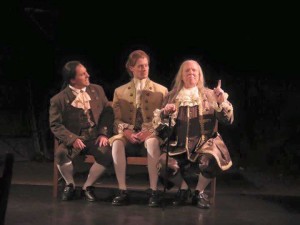
The ensemble has to remember, and this is the same in any show, but with this one in particular— night after night you’re giving the same lines and the same text. But it has to be fresh. Every night must be the first time these men have heard these ideas, the first time that they have thought these thoughts. It all has to remain very clear, especially during the debates. There has to be split sides and honest reactions. There has to be a continual effort to keep it fresh and alive and moving. People come in with preconceived notions that history is boring, and we’re here to prove that simply isn’t the case.
If the founding fathers were able to come and see this production that you’re directing, what do you think they’d have to say?
Jeremy: If my research for this show has taught me anything, the founding fathers had just enough ego to make this whole America thing happen. I like to think that they would love that they are being remembered so fondly as they are here in 1776.
If you had to be one of the founding fathers, who would you be?
Jeremy: Certainly not John Adams! He was fighting a very hard battle and is typically not remembered the way that he should be. However, Franklin is. I guess that would have to be my answer. Ben Franklin—because he gets most of the laughs, invented the stove, and gets to be on the $100 bill.
Taking on this project means a world to you, what has it taught you about yourself as a director, as a performer, as a human being? What is the lesson you taking away from this project in the many facets in which you are involved?
Jeremy: Taking on this project is a further exploration of using theatre to represent truth. These are real people. These were real people and they should be remembered as such. With grace and humility, whether they be good or bad. It’s been especially interesting working on this show because that’s something you can get across more easily in a straight play. But to carry that through a musical number presents a separate complication. That has been a delight to solve.
Why should people come and see 1776 at Toby’s?
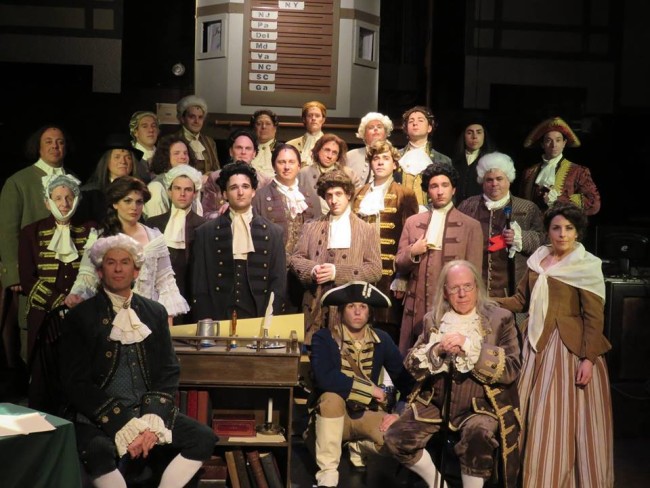
Jeremy: Other people have done it before and other theatres will do it again. But no theatre really has what we have at Toby’s. I said it earlier. When you walk into the space you are immediately immersed in the continental congress, that is an experience that you won’t get anywhere else and may never get again; being intimately sat among these historic men and women during the most pivotal point in American history— it’s an opportunity. The talent on the stage is exceptional and, at Toby’s, you get to experience that up close from every angle.
1776 plays through July 5, 2015 at Toby’s the Dinner Theatre of Columbia— 5900 Symphony Woods Road in Columbia, MD. For tickets please call (301) 596-6161 or purchase them online.

